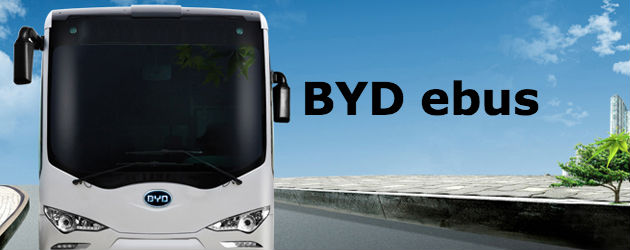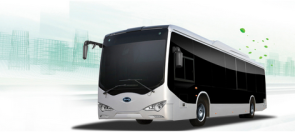Long Beach Transit Sides With BYD Motors For Low Emission Buses
 Courtesy of Long Beach Business Journal by George Economides: Following several hours of public input, the seven-member Long Beach Transit Board of Directors voted 5-2 on March 25 to support staff’s recommendation to contract with BYD Motors for the delivery of 10 low-emission, all-electric buses.
Courtesy of Long Beach Business Journal by George Economides: Following several hours of public input, the seven-member Long Beach Transit Board of Directors voted 5-2 on March 25 to support staff’s recommendation to contract with BYD Motors for the delivery of 10 low-emission, all-electric buses.
Boardmembers who voted in support did not address the arguments from numerous speakers to buy from an American-based company, Proterra, with manufacturing facilities in South Carolina, opting instead to go with the American subsidiary of a Chinese-owned company which does not yet have a manufacturing facility in this country. Also, BYD has no buses in use in the U.S., while Proterra does, and BYD has not passed what is known as Altoona testing – a comprehensive U.S. Federal Transit Administration (FTA) bus certification program – which Proterra passed in February 2012.
 At stake was a $12.1 million contract – funded primarily by a grant from the Federal Transit Administration’s Transit Investments for Greenhouse Gas and Energy Reduction (known as TIGGER). That funding source – using U.S. taxpayer dollars – was a major focus by those opposed to BYD.
At stake was a $12.1 million contract – funded primarily by a grant from the Federal Transit Administration’s Transit Investments for Greenhouse Gas and Energy Reduction (known as TIGGER). That funding source – using U.S. taxpayer dollars – was a major focus by those opposed to BYD.
One of the strongest arguments came from Ryan Popple, an investment partner with Kleiner Perkins Caufield & Byers, a firm, he said, that has financially supported more than 800 U.S. companies since 1972.
“I caution you that the hypothetical always looks easier than the actual in clean technology,” he said to the board. “I invest in U.S. clean tech because I believe we can be a global innovater in this important new industry. I still believe we are the world’s innovator. That’s what this is about. We’ve already made history with world-class EV technology for cars. Now Long Beach Transit can help lead in zero-emission transit technology and take the next step in furthering U.S. technology leadership. I think you should give the U.S. companies another shot at winning your business. Let’s work together to make this project an example of U.S. technology leadership.”
But Braden Riley, vice president of fleet sales for BYD, countered: “BYD is committed to make this project successful. We will stop at nothing to ensure that we meet the requirements for this project. BYD will take all the financial risk by supplying a performance bond for the entire amount, about $14 million, without any additional costs to Long Beach Transit.”
The performance bond promise was not, it appeared, to be part of BYD’s original bid. However, the final vote by the board did incorporate it. For example, one of the requirements in receiving the contract is that BYD meet Buy America standards, which calls for at least 60 percent of the bus be manufactured in the U.S.
BYD, according to LBT staff which analyzed the five bids responding to a request for proposal (RFP), has the lowest life-cycle costs of all the other buses.” BYD has nearly 1,000 low-emission buses in operation, mostly in China, with a handful in European and South American countries.
Two officials from the City of Lancaster, the city manager and the head of economic development, testified that BYD had “secured two properties to build their buses” in Lancaster, and that BYD was “fully permitted and ready to go.”
The city officials said Lancaster is “suffering” due to a 15 percent unemployment rate. “If BYD builds its manufacturing facility in Lancaster, the firm will hire back Americans,” said Vern Lawson, economic development director. “We think this is an opportunity to create an industry cluster in the County of Los Angeles and for the entire State of California, so we encourage you to accept your staff recommendation to award the contract to BYD.”
A BYD official had previously told the Business Journal that the company would not build a manufacturing facility unless it received bus orders. “We wouldn’t throw money at a market we don’t have orders for,” Micheal Austin, vice president, BYD America, said. “Absolutely,” building a manufacturing plant is dependent on receiving contracts.
An individual from a company that was one of the original bidders charged that LBT staff changed the RFP without issuing a corresponding amendment to the RFP and that it should have an opportunity to revise its proposal. But a transit staffer said the RFP was very open to ideas and suggestions in fulfilling LBT’s bus needs. “You [referring to the RFP] tell us what you believe is your best solution to help LBT meet our route requirements,” he stated. “So we opened it up to anything. . . . We left it open and asked them [the bidders] to give us their best proposal.”
Kevin Smith, CEO, of Santa Monica-based Solar Reserve, which makes solar power plants, said he was concerned about U.S. manufacturing and technology issues. He told the board that his firm competes internationally for business against companies that have strong support from their governments, “including, quite frankly, from the Chinese. I’m here because I think it’s important that if we have U.S. government support on projects like this [buses], that it is extremely important that we maintain U.S. technology dominance in some of these areas.”
He pointed out what happened with the renewable energy industry. “It’s not really a great story. We [the U.S.] started out as one of the leaders in PV technology [photovoltaics, a method of generating electrical power by converting solar radiation into direct current electricity], where the U.S. [held] dominance; Chinese manufacturers came in, undercut prices, pushed out a lot of the U.S. manufacturers. We’re now taking a back seat to the Chinese manufacturers and we’re struggling worldwide.”
Smith added: “If the board makes a decision to take U.S. federal funding and put it into support Chinese technology that is attempting to crush U.S. technology, it will have national recognition.”
Following the public testimony and a few staff responses to that testimony, Board Chair Barbara Sullivan George – who did not make one comment the entire meeting about the testimony presented – asked for a motion to approve the staff recommendation. After a motion and a second, she immediately asked for a vote before realizing boardmembers had a right to ask questions.
Boardmember Maricela de Rivera, a bus rider, said she wanted to delay the vote. “I do not feel comfortable with a company [BYD] that has not built a bus that has been tested by Altoona that will be on our streets. . . . I have questions, and a lot of those are related to the safety of the bus my son is going to be on. . . . This is a pilot project . . . I’m not ready to make a decision.”
Boardmember Lori Ann Farrell, the city’s former director of financial management, concurred. “I have concerns about entering into a contract with a company that does not have an Altoona tested bus.”
 She continued: “We have to have a fiduciary responsibility for the federal funds. We need to hold ourselves to a slightly higher standard . . . We’ve got to get this right. . . . Altoona testing is critical, critical. I cannot, in good conscience, vote to approve a motion that is not talking about buses to American specifications, with American requirements, that has already been built in America, that meets Buy America, and then will be Altoona tested. We’re chasing ghosts . . . we cannot put the cart before the horse, and authorize staff to enter in to a contract. We wouldn’t fathom buying a car that we’ve never seen. This is a $10 million bus purchase. . . . We need more independent verification, I’d also like a little bit more on the financials. . . . We need to be extra, extra careful and not put the cart before the horse [and] enter into a contract with anyone until, at a minimum, the bus has been built and the bus has passed Altoona testing.”
She continued: “We have to have a fiduciary responsibility for the federal funds. We need to hold ourselves to a slightly higher standard . . . We’ve got to get this right. . . . Altoona testing is critical, critical. I cannot, in good conscience, vote to approve a motion that is not talking about buses to American specifications, with American requirements, that has already been built in America, that meets Buy America, and then will be Altoona tested. We’re chasing ghosts . . . we cannot put the cart before the horse, and authorize staff to enter in to a contract. We wouldn’t fathom buying a car that we’ve never seen. This is a $10 million bus purchase. . . . We need more independent verification, I’d also like a little bit more on the financials. . . . We need to be extra, extra careful and not put the cart before the horse [and] enter into a contract with anyone until, at a minimum, the bus has been built and the bus has passed Altoona testing.”
Category: General Update, Green, Transit News, Vehicles










